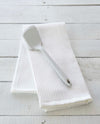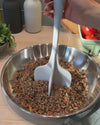Recipes
How Often To Baste a Turkey so That It Stays Juicy
Published
April 16, 2024
Reviewed by
Suze Dowling

When it comes to preparing a mouthwatering turkey that leaves your guests craving more, one essential technique stands out — basting. The art of basting involves coating the turkey with its own juices or a flavorful liquid mixture during the roasting process. This simple step holds the key to unlocking a juicy, tender turkey that delights the senses.
Are you wondering about the magic behind basting and how often you should perform this culinary ritual to achieve the perfect turkey? Join us as we explore the nuances of basting and uncover the secrets to succulent turkey preparation.
By the end of this detailed guide, you'll be equipped with the knowledge to baste your turkey like a pro and savor the delicious results.
What Is the Role of Basting in Turkey Preparation?
Basting is a transformative process when cooking a turkey, elevating the bird from a simple main course to a masterpiece. By regularly drizzling the cooking juices or a savory liquid over the turkey as it roasts, basting helps to lock in moisture, infuse flavors, and develop a beautifully golden-brown exterior.
The process of basting involves imparting layers to the turkey's taste profile. As the basting liquid cascades over the turkey, it carries with it a blend of aromas and flavors. Traditionally, basting involves using a bulb baster or a spoon to scoop up the pan juices and gently drizzle them over the turkey.
The act of basting is a ritual that connects the cook to the culinary journey unfolding in the oven. Let’s get more in-depth.
What Are the Factors Influencing Juiciness in Turkey?
Achieving the pinnacle of juiciness in a roasted turkey involves understanding the multitude of factors that contribute to its succulence. Factors such as the quality of the turkey itself, the cooking temperature, and, yes, the frequency of basting all play essential roles in determining the juiciness of your bird.
Choosing a high-quality turkey, rich in flavor and texture, can set the foundation for a delicious end result. Opting for a fresh, free-range bird or a well-raised turkey can significantly impact the juiciness and overall taste of the final dish. Additionally, closely monitoring the cooking temperature throughout the roasting process ensures that the turkey cooks evenly and retains its natural juices.
The frequency of basting also directly influences the juiciness of your turkey. While some chefs advocate for frequent basting every 30 minutes, others prefer a more hands-off approach. Understanding how these factors interplay can help you navigate the journey to a perfectly juicy turkey with confidence and finesse.
What Are Some Basting Techniques and Tips?
Mastering the art of basting involves more than just a repetitive motion during roasting — it requires finesse and attention to detail. Use various basting techniques to elevate the juiciness and flavor of your turkey to new heights. Whether you prefer the precision of a bulb baster or the rustic charm of a basting brush, the key lies in ensuring that the basting liquid effectively coats the turkey's surface and seeps into the meat.
To enhance the flavor profile of your turkey, consider infusing the basting liquid with aromatic herbs, spices, or citrus zest. This added layer will contribute to the overall taste and tantalize the senses with each baste. Experiment with different flavor combinations to discover a concoction that perfectly complements your turkey and adds a gourmet touch to your holiday feast.
How Often Should You Baste a Turkey?
The age-old question of how frequently to baste a turkey during its time in the oven is a subject of much debate among home cooks. While some swear by the practice of basting every 30 minutes to ensure a moist outcome, others argue for a more hands-off approach, asserting that frequent basting can disrupt the cooking process and lead to fluctuations in oven temperature.
The optimal frequency of basting a turkey ultimately depends on various factors, including the size of the bird, the cooking temperature, and personal preferences. For a standard-sized turkey, a general rule of thumb is to baste every 45 minutes to an hour to maintain moisture levels and enhance flavor. However, larger turkeys may benefit from more frequent basting to prevent dryness and promote even cooking.
Experiment with different basting schedules to find the best rhythm for your specific turkey and oven setup. Whether you opt for a traditional approach with regular basting intervals or prefer a more restrained strategy, the key is to observe the turkey's progress throughout the roasting process and adjust your basting frequency accordingly.
What Are Alternatives to Basting?
While basting remains a tried-and-true method for imparting juiciness and flavor to a turkey, several alternative techniques can achieve similar results with a unique twist. Explore these innovative approaches to turkey preparation to broaden your horizons and elevate your holiday feast to new heights.
- Brining: Consider brining your turkey before roasting to infuse it with moisture and flavor from within. A saltwater solution combined with herbs and spices can work wonders in enhancing the juiciness and tenderness of the meat, resulting in a delectable turkey with a perfect balance of seasoning. If you’re new to brining, try the brine mixture in our Soy and Black Tea Roasted Duck Recipe. It will be delicious with turkey, too.
- Buttering Under the Skin: For a rich and indulgent twist on traditional basting, try placing softened butter or herb-infused butter under the turkey's skin before roasting. This technique allows the butter to melt into the meat as it cooks, creating a luscious and flavorful bird that is sure to impress your guests.
- Using a Cooking Bag: Opting for a cooking bag to roast your turkey can simplify basting while sealing in moisture and flavors. The bag creates a steamy environment that helps the turkey cook evenly and retain its natural juices, producing a juicy and succulent end product with minimal effort.
What Are Additional Cooking Tips for a Perfectly Juicy Turkey?
Creating a masterpiece out of a turkey may involve more than just basting — it requires an approach that encompasses various cooking techniques and preparations. To ensure that your holiday bird emerges from the oven tender, juicy, and bursting with flavor, consider implementing these essential cooking tips:
- Trussing Turkey: Trussing helps the turkey cook evenly and retains its shape during roasting, resulting in a beautifully presented bird with moist, well-cooked meat. Secure the wings and legs close to the body using kitchen twine to facilitate a uniform cooking process.
- Resting Before Carving: Let the turkey rest for about 20-30 minutes after roasting before carving. This resting period allows the juices to redistribute within the meat, ensuring a tender and succulent final product. Cover the turkey loosely with foil to retain heat while it rests.
- Monitoring Internal Temperature: Invest in a reliable meat thermometer to track the turkey's internal temperature throughout the cooking process. The turkey is safe to eat when it reaches an internal temperature of 165°F (74°C), ensuring that it is fully cooked while maintaining optimal juiciness.
- Choosing the Right Cooking Equipment: Selecting the appropriate roasting pan and cooking equipment can significantly impact the outcome of your turkey. Use a sturdy roasting pan with a rack to elevate the turkey above the drippings and promote even cooking. Consider covering the turkey with foil partway through roasting to prevent excessive browning.
The Takeaway
By infusing your turkey preparation with creativity, you can transform a simple roast turkey into a centerpiece that embodies the spirit of the season and the joy of sharing a delicious meal with loved ones.
By incorporating high-quality kitchen tools from GIR into your culinary arsenal, you can elevate your cooking experience. With innovative designs and superior functionality, GIR products are meticulously crafted to help cooks of all skill levels prepare meals with ease and precision. So, savor every moment, relish every flavor, and bask in the delight of a beautifully roasted turkey that reflects your dedication, expertise, and love of cooking.
Shop our collection today to have the cooking experience you deserve.
Sources:
Resting Meat is Worth It—and We’ve Got the Data to Prove It | America’s Test Kitchen
Preparing Your Holiday Turkey Safely | CDC
How to Brine a Turkey | Butterball
How to Truss a Turkey in 3 Easy Steps (And Why You Might Want To) | Better Homes & Gardens
























